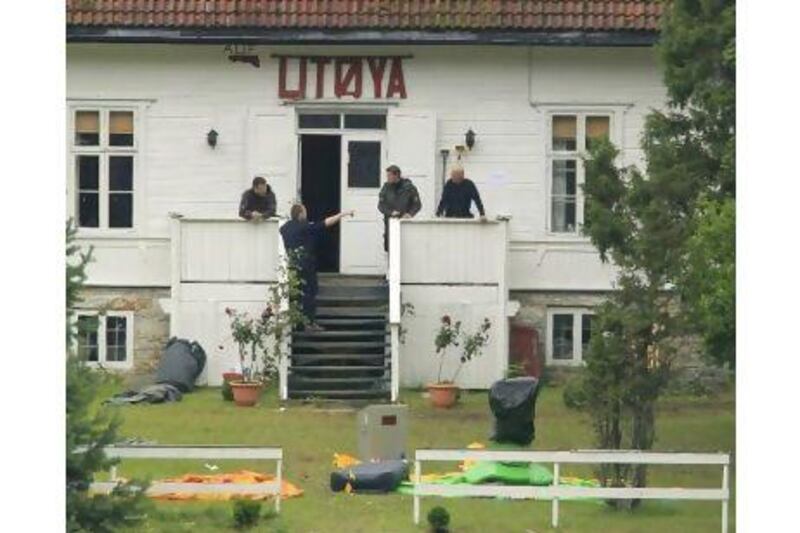HONEFOSS, Norway // Hussein Kazemi has faced danger many times before. Maybe that is why the teenager can still smile as he sits in his hospital bed, bullet wounds in both legs and an arm, and images of a crazed gunman in his head.
Picture gallery: Norway mourns victims as killer is taken to court
Hundreds of thousands of Norwegians packed city centres across the country to pay tribute to the 76 people killed in twin attacks last week. A court hearing was held on the same day for the 32 year old suspect, Anders Behring Breivik, that was closed off to the media.
Hussein, 19, an asylum-seeker from Afghanistan who sought safety in Norway two years ago, is one of dozens still hospitalised after the gun rampage on an island campsite that killed 67 people, mostly teens and young adults. A Norwegian with anti-immigration views has confessed to the attack, which left scores wounded.
"I experienced many dangers in Afghanistan. But this is the worst experience I will ever have in my life," Hussein said in a bedside interview Sunday, two days after the attack.
Even so, he still holds a positive view of his adopted home. "I have experienced much good in Norway, so much good," he said.
Many immigrants or children of immigrants were at the camp, an annual event for Norway's Labour Party activists. Mr Kazemi said the shooting began soon after he finished playing a soccer game featuring a veritable United Nations of fellow party activists from Afghanistan, Georgia, the Kurdish regions of Turkey and Iraq, Sri Lanka, Somalia, Lebanon and other countries.
Norway's liberal government has traditionally been relatively open to asylum-seekers countries plagued by violence. That is a central complaint in the online rant published by the gunman, the 32-year-old Norwegian nationalist Anders Behring Breivik, who proclaims a vision of a Europe wiped clean of Muslims.
Mr Kazemi said the gunman did not appear to be targeting campers of a particular hue or religious wardrobe.
"He seemed to want to kill everyone. No one was to be spared," he said in comments partly translated by his older stepbrother from his native Afghan language of Dari.
Mr Kazemi was in the camp cafeteria Friday when he heard commotion outside: sounds like firecrackers, then screams. Others more aware of what was happening fell on the floor.
"So I threw myself down too, but I didn't know why," he said.
Then he saw the gunman. People around him fell from gunshots. He joined survivors in a mad 10-minute sprint into the forest outside.
It was only when they reached a rocky shoreline, puffing from exhaustion, that friends stared, frightened, at Mr Kazemi. He'd been shot at least once, most probably back in the initial cafeteria melee.
"My leg was caked with blood. I hadn't noticed. I was too busy just trying to stay alive," he said.
He had no time to consider first aid. The gunman had followed them and was firing bursts from his rifle.
The teens and young adults had two dangerous option: to hide behind a rock, or to dive into the bone-chilling water and attempt a long crossing to the mainland at least 600 meters away.
Mr Kazemi tried both, first hugging the rocky ground until shots rained around him. He jumped into the water, even though he's never learned to swim. He gagged from inhaling water, then clung to a rocky outcropping to keep from going under.
The gunman kept shooting. Bodies were bobbing around Mr Kazemi in the water, which their blood turned from gray-blue to burgundy. He estimates that 20 fellow campers were dead or dying in the choppy waters.
He tried to lie still. Soon the gunman diverted his attention to farther along the shore, where girls were crying and screaming. After the sounds of more gunshots, he said, the screaming stopped.
After another half-hour of playing dead on the shoreline, he said, police arrived in boats.
Mr Kazemi's bright, unceasing smile suggests a teenager in the full bloom of health. But aided by a brother and stepbrother, Mr Kazemi gingerly lifts the sheets with his uninjured right arm to reveal bullet wounds to both thighs, just above the knees, and a tightly wrapped ankle from a gunshot to his right heel. His left arm was grazed by another bullet.
"The doctor says I will walk fine again, but I need another surgery tonight," he said. "I am strong."
When asked if he now considered Norway a hostile place to stay, Mr Kazemi offered an emphatic "No." He said he had survived many risks in his native city of Herat and never doubted he could survive this too.
"You have only one life and you must take the good with the bad," he said.
"There will always be both. Life is like that. There are ups and downs. In a dangerous place you always have a chance to live, and in a safe place you always have a chance of being killed. It's destiny and you cannot avoid it."






